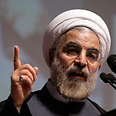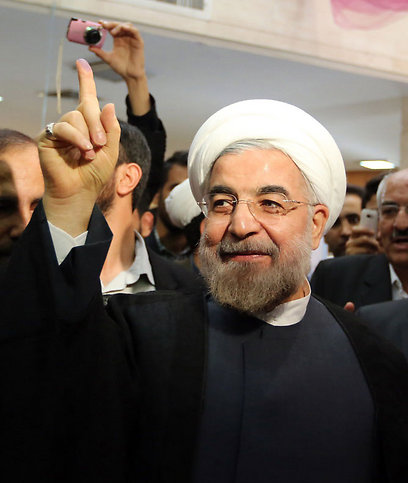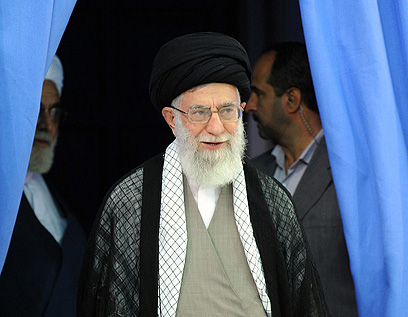
Netanyahu on Iran vote: We're not deluding ourselves
PM cautions against 'wishful thinking' after Rohani's election, claims nuclear policy-maker is Ayatollah Khamenei, not president; MK Mofaz: Rohani will keep nuke program running
A day after the surprise victory by Hassan Rohani in Iran's presidential election was announced, Prime Minister Benjamin Netanyahu expressed pessimism regarding the possibility that the Islamic Republic might change its nuclear policies.
"We do not delude ourselves," Netanyahu said during Sunday's weekly cabinet meeting. "The international community mustn't be tempted into wishful thinking. We must remember that in any case, (Supreme Leader) Ayatollah Ali Khamenei is the one determining Iran's nuclear policy."
Related stories:
- US tells Iran to respect its people's will after election
- Meet Hassan Rohani – Iran's new president
- Moderate cleric Rohani wins Iran presidential election
"We must keep in mind that the Iranian leader (Khamenei) disqualified the candidates who did not hold his radical views. Among those he did allow (to run), the candidate who was seen as the least affiliated with the regime was elected. But we are still talking about someone who refers to the State of Israel as the 'great Zionist Satan,'" the PM told the cabinet meeting.
The Israeli leader said that sanctions on Iran should be increased to pressure Tehran to end its suspect nuclear program. "The more pressure increases on Iran so will the chance of ending Iran's nuclear program which remains the biggest threat to world peace," Netanyahu said. "The only thing that brought about a temporary freeze of Iran's nuclear program was its fear of an attack in 2003."
Tourism Minister Uzi Landau warned that the election of a seemingly moderate Iranian president would "only make it more difficult to convince the world of Iran's true nature," adding "we must do everything so that Iran, under this guise of moderateness, does not race toward a bomb. I hope they won't be gullible in the West and take their foot off the pedal in light of the election results."
Environmental Protection Minister Amir Peretz was more hopeful in light of the "atmosphere which proved that the Iranian nation is optimistic and seeks dialogue."
Although Rohani is considered as a relative moderate and had the backing of Iranian reformists, Supreme Leader Ayatollah Khamenei is the ultimate authority on all state matters and key security policy decisions - including nuclear efforts, defense and foreign affairs - remain solidly in the hands of the ruling clerics and their powerful protectors, the Revolutionary Guard.
Speaking at Ynet's studio, Kadima Chairman MK Shaul Mofaz said that Rohani will be more willing to take steps toward the West but will not stop the nuclear program.
"Our policy should be responsible and deliberate. Israel should rely on a working premise that there is no change to Iran's nuclear program. The military option should be the last after talks and sanctions, but shouldn't be off the table," he said.

'Not the man in charge.' Rohani (Photo: AFP)
Ynet analyst Ron Ben-Yishai explained that Khamenei still determines Iran's overall policy. He said "the greatest immediate danger is that the West will not continue with the sanctions, or will ease them as a gesture to Rohani." However, Ben-Yishai claimed, Iran fears the US is preparing another "sanctions package" in case Iran will not change its policy soon.
Meanwhile, Yuval Steinitz, Israel's minister of intelligence and strategic affairs, said that sanctions on Iran should be increased to pressure Tehran to end its suspect nuclear program, despite the election of a reformist-backed president, as nuclear efforts remain firmly in the hands of ruling clerics.
"It's good to see the Iranian people protest against the radical regime," Steinitz said. But he cautioned, "As long as we don't see a change it's better to be wary and not celebrate prematurely."

'Determines Iran's nuclear policy.' Khamenei (Photo: FP PHOTO / HO / KHAMENEI.IR)
Steinitz is close to Israeli Prime Minister Netanyahu and is responsible for monitoring Iran's nuclear program.
He said he doubted that the election of the new president will soften Iran's stance in its nuclear standoff with the west. "Therefore the international community needs to work hard to tighten sanctions and present a clear ultimatum to Iran in order to maybe bring about change," Steinitz said.
"The Iranians today are very close to the red line, they are about a year or less to a first (nuclear) bomb," he said.
Israel considers a nuclear-armed Iran to be an existential threat, citing Iranian calls for Israel's destruction, its support for anti-Israel terrorist groups and its missile and nuclear technology.
Tehran insists its nuclear program is peaceful, a claim that Israel and many Western countries reject
Israel has said that it prefers diplomacy and sanctions to end Iran's nuclear program but has hinted that military action would be an option if other peaceful attempts fail. It has called on the international community to issue a clear ultimatum to Iran to curb its nuclear program.
Rohani's predecessor Mahmoud Ahmadinejad on multiple occasions made references to the destruction of the Jewish state.
AP contributed to this report
- Receive Ynetnews updates directly to your desktop











